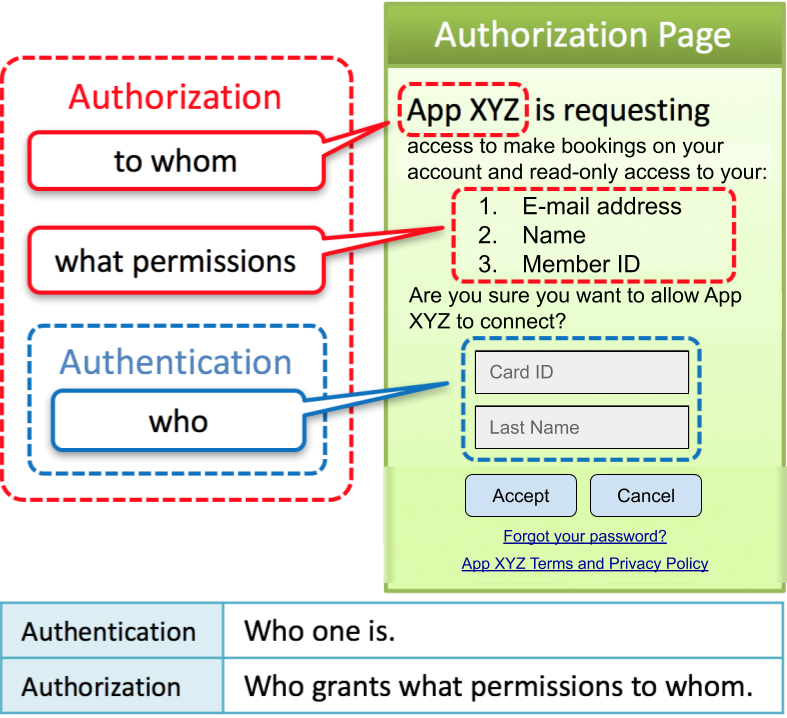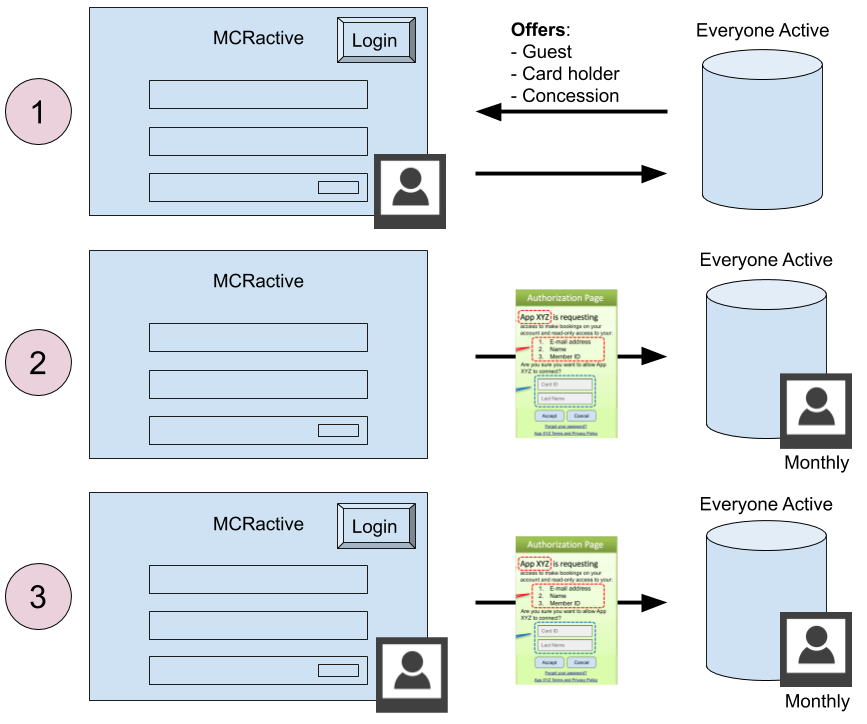Discussing with Debbie at Everyone Active, she's pointed out that Westminster are looking for a custom set of fields for the verification, and hence an implementation may need to support more than one set of credential options, e.g. "Member ID and Pin", "Card Number and Last Name", "E-mail address and Password" etc.

Also note that the above would be useful for booking where there is a restriction in place, to allow existing members to book e.g. "Casual Gym" or "Climbing Wall" (which require an induction). These would not be available to normal guest checkout customers, so we would need a way of differentiating those activities that require an account or Customer Authentication vs those that are ok to book as guest?
So in the open data, could we have a flag or similar to say "requires Customer Authentication to book"? Could use availableChannel for this, for example with a https://openactive.io/OpenBookingCustomerAuthentication?
E.g. for Casual Gym there's an online booking video on the Everyone Active website.
Also note that the advanced booking period may be different for logged in customers compared with guests, so the open data would need to indicate this? Within Gladstone this is by price level / subscription, so it will vary wildly between customers - and so perhaps e.g. a simple membership-only version of oa:validFromBeforeStartDate is too simple?
Also note you'd need to display the privacy policy of the broker in the same window along with their consent.
The validation page also needs the ability to block login if too many failed login attempts have occurred, for security.

Proposer
MCRactive, Westminster City Council, Everyone Active, Gladstone, Playwaze, SportBuddy, Deuce, Bristol City Council, London Sport, Played, Sport:80
Reference email threads: 1, 2, 3
Use Case
As an existing member of Everyone Active, I want to be able to use my membership through MCRactive, Active Westminster, Deuce, and SportBuddy to find and book activities and facilities, ensuring that I pay prices that include any membership discounts (include discounted to "free" if appropriate).
This is particularly useful to the activity provider for retention-based use cases (e.g. brokers that provide health tracking or motivational tools).
Why is this needed?
The existing booking specification includes a recommendation for "11.7.3 Customer level authentication”, but no mechanism to allow these details to be used as part of the booking flows, except for an example extension which does not include enough information to fully specify an implementation.
User journey
1) An anonymous Customer using a Broker is prompted to choose between "Guest Checkout" and "Use my existing membership".
2) A logged-in Customer using a Broker is prompted to "Connect my existing membership" so that subsequent purchases can make use of that membership where relevant.
Proposal
Open Booking API 1.0 CR section 11.7.3 currently recommends the popular standard OpenID Connect for Customer Authentication. The OpenID Connect flow is the same flow that is used for "Login with Facebook" or "Login with Google" that many users are already familiar with:
This proposal recommends building on this existing recommendation with a mechanism to allow this authenticated Customer to make a booking.
Model additions
This can be achieved with minor updates to the existing specification, via the introduction of a new
AuthenticatedPersontype that subclassesPerson. ThisAuthenticatedPersoncan be used as both acustomerandattendee, in place of a "guest"Person, and alongside other "guest"Persons.The
AuthenticatedPersontype includes an additionalaccessTokenproperty, which is used to demonstrate the Broker's authorization to book on behalf of the Customer, and also to identify that Customer. Following Open ID Connect conventions, aaccessTokenis usually short lived (e.g. 1-2 hours).The
AuthenticatedPersonmust be valid against theOrderItemfor which it is used (ifattendee), or valid against allOrderItems (ifcustomer). If this is not the case, a specific subclass ofOpenBookingErrorshould be returned against theOrderItem, or wholeOrder, respectively.Classes
oa:AuthenticatedPersonschema:PersonProperties
oa:AuthenticatedPerson)oa:accessTokenschema:TextRestricted access to Booking System personal data
To inform the Customer that their linked account has been used to create the Order, for the purposes of audit and attribution, to take payment, and to allow for e-mail notifications to be sent in user journey (1) a minimal set of fields of personal data are required.
The proposal recommends that the customer's e-mail (and membership identifier, if different from e-mail) MUST be supplied in the response to C1 , C2 , and B within
AuthenticatedPerson, usingemailandidentifierproperties as appropriate. Additional properties ofPersonMAY also be supplied, such asgivenNameandfamilyName. The OpenID Connect flow will capture explicit consent from the customer to share this data, which mitigates any concerns around GDPR.To ensure minimum exposure of the personal data that the Customer has agreed to share, the
accessTokenMUST be either an opaque token (that contains no personal data) or an encrypted JWT (that contains only the Customer's unique identifier, and is encrypted). If an encrypted JWT is used, theaccessTokenMUST NOT be stored for longer than its expiry (typically 1-2 days).In order to ensure that the personal data received is not used outside of the bounds of providing the service, this personal data MUST NOT be used for any other purpose outside of generating invoices, VAT receipts and notifications relating specifically to that unique Order. For the avoidance of doubt, it MUST NOT be used for creation of an account in the Broker, or for other communication outside of those required to service that specific Order, without the Seller's explicit consent (and Customer's explicit consent, where GDPR requires it).
Security
Due to the ability for B to return personal data from the Booking System, which relies on the
accessTokenbeing supplied from the results of user authentication, thecodeflow of Open ID Connect is strongly recommended, and theimplicitflow RFC6749 MUST NOT be used (ref).Offline access
In order to allow the Broker to make bookings without requiring continual re-authentication of the Customer, Offline Access MUST be permitted, where the user has explicitly consented (as per OpenID Connect spec), using a
refresh_token.Pricing
The prices returned for the Offers requested by the Broker on behalf of the Customer MUST match the expectations of the Customer based on any existing membership with the Seller.
Broker contract with Booking System
Currently "The Broker MUST call C1 (without Customer details)", however with this proposal the Broker MAY supply the
AuthenticatedPersonat C1 , if known, to have C1 return the correct pricing.Open Questions and Design Decisions
Access to additional personal data
It is possible for the specification to recommend a means for Brokers to access additional personal data about the Customer, via the OpenID Connect
/userinfoendpoint of the Booking System. A Booking System MAY make a number of claims available to the Broker via this mechanism within the Open ID Connect specification.Do we want to recommend use of
/userinfowithin the Open Booking API?To keep the core of Open Booking API cleanly separated from the authentication approach, to adopt a privacy-first approach, and to ensure that the API remains applicable to the broadest number of use cases - the proposal currently recommends that it is better to not include reference to
/userinfospecifically in the Open Booking API specification, and certainly not to require it for the flow.OpenID Connect
id_tokenvsaccess_tokenIn the OpenID Connect specification, the intended audience of the
id_tokenis the client application (Broker), where the intended audience of theaccess_tokenis the resource server (Booking System). The token for this use case is primarily intended to be received by the Booking System, to provide access to book on the user's behalf. Hence theaccess_tokenis the relevant token to use here. Theaccess_tokenalso contains the minimum personally identifiable information by default.OpenID Connect
id_tokenvs/userinfoviaaccess_tokenWithin OpenID Connect there are two standard options for getting the authenticated user's details: the OpenID Connect (OIDC) specification includes:
refresh_tokenwas used./userinfoendpoint accessible via anaccess_tokenaccess_token, which can be extended via therefresh_token.Due to the possibility of token substitution attacks, the
/userinforesponse is not guaranteed to be about the End-User identified by the sub (subject) element of the ID Token. "The sub Claim in the UserInfo Response MUST be verified to exactly match the sub Claim in the ID Token; if they do not match, the UserInfo Response values MUST NOT be used.". Hence theid_tokenis required even with access to/userinfo.As above, perhaps it is better to not recommend either of the above specifically, and not to require them in the flow.
Example
C1 , C2 and B request:
C1 , C2 and B response: